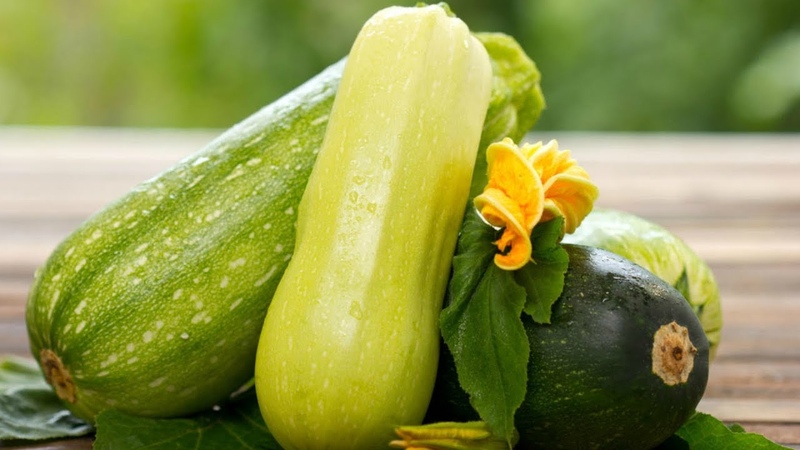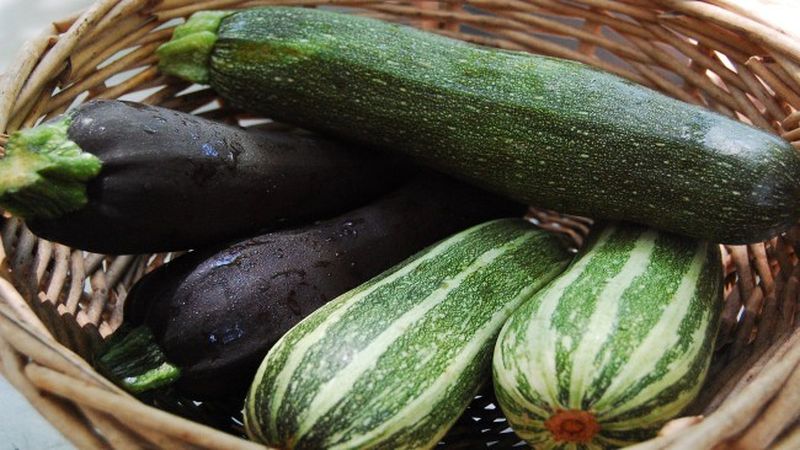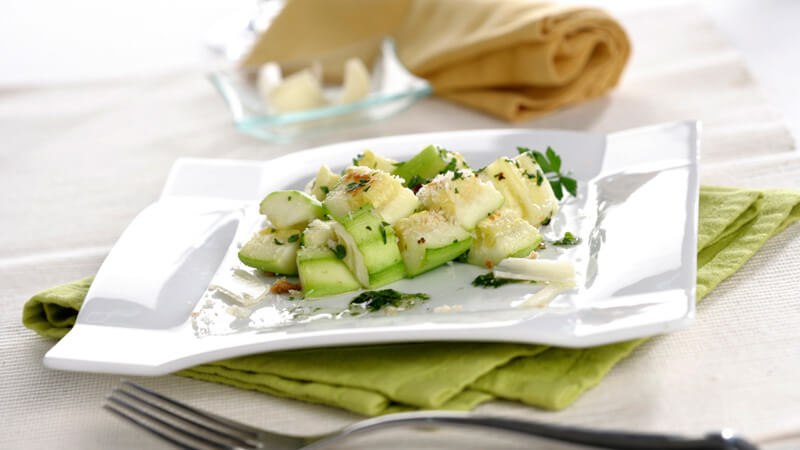The benefits and harms of zucchini for human health: how much to eat and in what form, so as not to harm the body
Zucchini is unpretentious in the garden, and on the table it is combined with any ingredients. Due to its low calorie content, it has made its way into many vegetable stews and casseroles. They also use it as a separate dish. Having an unobtrusive pleasant taste, it is good in any form.
What else zucchini are famous for, what are their benefits and harms to humans, as well as how much zucchini can be eaten per day - you will find out in our article.
The content of the article
Zucchini: benefits and harms to human health
Homeland squash - Northern Mexico. It came to Europe in the 16th century, but at first it was considered an ornamental plant, it was bred in gardens. Italians were the first to taste its tender and tasty pulp.
This nutritious vegetable is a close relative of pumpkin. It has a positive effect on many processes in the human body.
Composition
By its properties, richness of vitamins and minerals, zucchini has long been among the most popular dietary products, because 100 g only 25-30 kcal.
The rest of the indicators are as follows:
- proteins - 0.6 g (0.73% of the daily value)
- fat - 0.3 g (0.46% of the daily value)
- carbohydrates - 4.6 g (3.59% of the DV)
From the ratio of BJU, it can be seen that it contains a lot of carbohydrates, which means that zucchini is an additional charge of energy and nutrition for the brain.
In terms of the presence of vitamins, vitamin C takes the first place - it is 16.7% of the daily value in 100 g of the product. Vitamin C contributes to the normal functioning of the immune system, strengthens the walls of blood vessels.
Zucchini contains almost the entire group of vitamin B:
| B vitamins | Daily allowance for an adult | Zucchini presence | Percentage |
| Thiamine (B1) | 1.5 mg | 0.03 mg | 2% |
| Riboflavin (B2) | 1.8 mg | 0.03 mg | 1.7% |
| Choline (B4) | 500 mg | 9.5 mg | 1.9% |
| Calcium pantothenate (B5) | 5 mg | 0.1 mg | 2% |
| Pyridoxine (B6) | 2 mg | 0.11 mg | 5.5% |
| Folic acid (B9) | 400 mcg | 14 μg | 3.5% |
As for minerals, the record holder among them is silicon: there are 30 mg of it in 100 g of squash, which is the body's daily need for this mineral.
reference... Thanks to silicon, calcium is absorbed, collagen production is stimulated. The condition of bones, hair, nails, teeth depends on this.
The use of zucchini for various diseases
As a valuable food product, zucchini is recommended for use in many diseases - it contains many vitamins, minerals, dietary fiber and trace elements. It is useful to use its pulp, skin, seed and juice.
Diabetes
This insidious disease can lead to disability, and in cases of its acquisition in childhood and adolescence in advanced cases (type 1) - and death. The main weapon in the fight against diabetes is adherence to a strict diet and control of blood sugar. Diabetics are prohibited from eating many foods containing carbohydrates and fats.
But zucchini is an easy product, they can be included in the menu. The pectin contained in the vegetable is a polysaccharide of a natural organic compound that lowers cholesterol, strengthens blood vessels, and regulates blood glucose levels without increasing insulin levels. Zucchini in dishes for diabetics can be present in baked and raw form.
It is better not to eat fried vegetables, because nutrition for patients with diabetes mellitus excludes not only sweet, but also fatty foods.
Diseases of the gastrointestinal tract
For diseases such as ulcers or gastritis, zucchini can also be used as a dietary meal, but not in the acute stage. These vegetables do not irritate the stomach lining, moreover, thanks to pectin, it heals.
It must be introduced into the diet in a boiled, steamed or baked form, to prepare a puree soup from it.
A raw food diet, the use of zucchini with hot sauces and mayonnaise for gastrointestinal diseases is unacceptable.
Constipation
Dietary fiber in 100 g of zucchini is 1 g, which is 5% of the daily value, therefore it is indicated for inclusion in the menu for atonic and chronic constipation, which, if left untreated, contribute to a decrease in immunity, intoxication of the whole body and are fraught with such an unpleasant disease like hemorrhoids.
For constipation, zucchini is best eaten raw - in the form of juice or in a mix with other fiber-rich vegetables: pumpkin, tomatoes, cabbage.
Useful properties of zucchini
No matter how you cook it, it will certainly benefit the body: it will have a beneficial effect on digestion, on the condition of the skin and hair. Even fried zucchini will not do much harm if you are not sick with diabetes and do not seek to lose weight: you can afford to eat them 1-2 times a week.
Zucchini is useful at any age: in infancy - for the development and strengthening of all body functions, in old age - for the prevention of atherosclerosis.
The use of zucchini affects the female and male body in different ways.
For men
It is no secret that a strong half of humanity is more susceptible to heart disease, and every year heart attacks among men "get younger." To protect the body from the effects of stress, to keep the nerve cells and the circulatory system in good condition, men are advised to introduce zucchini into the menu.
In addition, it is believed that this vegetable improves potency, stimulates the production of male hormones. If you cannot conceive a child, try the zucchini diet: eat 1-2 zucchini daily, baked or raw. The vegetable affects the activity of the sperm.
Important! When eating zucchini raw, remember that pesticides are very common when growing vegetables, so each vegetable must be thoroughly rinsed in warm water with baking soda before cooking.
For women
Zucchini is also very beneficial for women. It is suitable for regular use during pregnancy:
- quickly saturates, but does not lead to weight gain;
- not allergic;
- helps the body to remove excess fluid, which means it will relieve swelling;
- magnesium and potassium in zucchini have a beneficial effect on the development of the fetus;
- fights against constipation, and therefore with their consequence - hemorrhoids;
- removes toxins.
Pediatricians recommend a vegetable for breastfeeding, because it increases lactation, is harmless to babies. Nursing mothers can eat it stewed or boiled a week after the baby is born.
To maintain beauty and youthfulness, masks from zucchini will be useful for women: it perfectly moisturizes and tightens the skin. Especially recommended for owners of oily and mixed skin types. You just need to grate the zucchini on a fine grater and distribute it on the face, paying special attention to the T-zone. After 15 minutes, wash off with warm water.
For kids
This vegetable in high season will be a useful complementary food for babies from 6 months. Before mashing, soak young zucchini without skin damage in water for 30 minutes to remove pesticides, if any. After peeling the vegetable, rinse it again and then boil it, throwing it immediately into boiling water (or steam). Then rub through a sieve - a tasty and valuable complementary food is ready.
The older the baby becomes, the more demands he makes for food, and if he does not like the colorless taste of a boiled vegetable, this is not a reason to give it up forever.
You can approach the preparation of dishes for children with imagination.Omelettes, pancakes, casseroles, squash caviar, cream soup are just some of what you can offer your child. Therefore, the sooner you teach your child to eat this necessary food for the growing body, the healthier he will be.

Processing and preparation
It is believed that when cooked, zucchini loses its beneficial properties. But scientists and nutritionists claim that the vegetable retains its unique qualities in any form, however, when frying, its calorie content increases.
In 100 g of fried zucchini - 86 kcal due to the oil in which it was fried. If you fry zucchini slices breaded with flour, then the calorie content will increase to 118 kcal.
The following cooking methods are more suitable for dietary nutrition:
- raw product. It can be used in salads with other vegetables, or it can be eaten separately;
- juice retains all vitamins and minerals, but it should be consumed in moderation, up to 2 glasses a day, as it can cause intestinal upset, stomach pain. In one glass of juice - 40 kcal;
- boiled and steamed vegetable contains up to 25 kcal;
- baked in foil without adding oil - about 30 kcal;
- stewed vegetable along with other vegetables (potatoes, onions, carrots) and a spoonful of vegetable oil - about 80 kcal.

If you are not planning to lose weight, but want to improve your health, then zucchini is a good product in any form, but juice from it is especially recommended. It is better absorbed by the body, improves intestinal peristalsis. By gently enveloping and protecting it, it normalizes metabolism, slows down the aging process of the body.
If we talk about preparations for the winter, then the methods that preserve the usefulness of the product are drying and freezing. Canned zucchini is delicious to taste, but salt, sugar, and vinegar minimize the vitamin content.
I would also like to say a few words about the famous squash caviar. Many people love it, but not everyone is sure whether it is useful, because prolonged heat treatment does not contribute to the preservation of vitamins. Meanwhile, it is proven to be a dietary product containing antioxidants, diuretics, pectin, and fiber. In 100 g of caviar - 90 kcal, while the body needs about 2000 kcal per day.
Contraindications for use
For all its usefulness, zucchini can be dangerous for people with kidney disease. If the process of removing potassium from the body is disturbed, then the use of zucchini is contraindicated.
With irritable bowel syndrome, ulcers and gastritis in acute conditions, this vegetable should be excluded from the diet, since it will provoke an exacerbation of the disease.
Overeating can disrupt the acid-base balance in the gastrointestinal tract, cause heartburn, nausea, and sharp cuts in the stomach and intestines.
Also, do not use it for individual intolerance.
Usage rates
Like any other food, zucchini should be consumed in moderation, whether you're on a diet or eating zucchini for overall health.
It is recommended to eat 200 g of zucchini per day (one full glass) for an adult who does not suffer from diseases in the acute phase. It can be raw or thermally processed.
Read also:
The best varieties of zucchini for open ground: a photo with a description, tips for choosing.
How to cook canned zucchini for the winter without sterilization.
The most delicious and simple recipes for salting zucchini for the winter in jars.
Zucchini for weight loss
For people who decide to lose weight by sitting on a squash diet, it is important to remember: in the diet of a healthy person, squash should be 1% in relation to other vegetables and fruits. Introduce zucchini along with other healthy foods, skillfully combine them.
Fasting days will be effective, during which only zucchini is used - up to 500 g per day.
Eventually
Include zucchini dishes in your daily menu, and you will see how beneficial it affects the body. It will help to get rid of extra pounds, improve cerebral circulation, heart and intestines, remove toxins and relieve swelling.The main thing is to make the right choice of dishes and not violate the norms of its use.